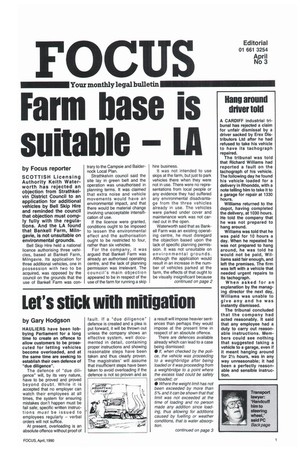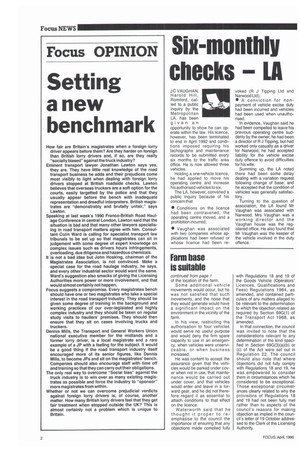Farm base is suitable LA
Page 3

Page 4

If you've noticed an error in this article please click here to report it so we can fix it.
by Focus reporter
SCOTTISH Licensing Authority Keith Waterworth has rejected an objection from Strathkelyin District Council to an application for additional vehicles by Bell Skip Hire and reminded the council that objection must comply fully with the regulations. And the LA found that Bankell Farm, MiIngavie, is not unsuitable on environmental grounds.
Bell Skip Hire held a national licence authorising three vehicles, based at Bankell Farm, Milngavie. Its application for three additional vehicles, one in possession with two to be acquired, was opposed by the council on the grounds that the use of Bankell Farm was con trary to the Campsie and Baldernock Local Plan.
Strathkelvin council said the site lay in green belt and the operation was unauthorised in planning terms. It was claimed that extra noise and vehicle movements would have an environmental impact, and that there would be material change involving unacceptable intensification of use.
If the licence were granted, conditions ought to be imposed to lessen the environmental effect and the authorisation ought to be restricted to four, rather than six vehicles.
For the company, ii was argued that Bankell Farm was already an authorised operating centre, and the lack of planning permission was irrelevant. The council's main objection appeared to be in respect of the use of the farm for running a skip hire business.
It was not intended to use skips at the farm, but just to park vehicles there when they were not in use. There were no representations from local people or any evidence they had suffered any environmental disadvantage from the three vehicles already in use. The vehicles were parked under cover and maintenance work was not carried out in the open.
Waterworth said that as Bankell Farm was an existing operating centre, he must disregard the objection based upon the lack of specific planning permission. It was not unsuitable on environmental grounds. Although the application would result in an increase in the number of vehicles parked at the farm, the effects of that ought to be visually insignificant because
continued from page 1 of the location of the farm.
Some additional vehicle movements would occur, but he was not satisfied that such movements, and the noise that they would generate would have a significant impact on the environment in the vicinity of the farm.
in his view, restricting the authorisation to four vehicles would serve no useful purpose and would deny the firm spare capacity to use in an emergency, when vehicles were unserviceable, or when business increased.
He was content to accept the assurance given that the vehicles would be parked under cover when not in use, that maintenance would be carried out under cover, and that vehicles would enter and leave in a forward gear, and he did not therefore regard it as essential to attach conditions to that effect on the licence.
Waterworth said that he thought it proper to reemphasise to the council the importance of ensuring that any objections made complied fully with Regulations 18 and 19 of the Goods Vehicle (Operators' Licences, Qualifications and Fees) Regulations 1984, as amended, and contained particulars of any matters alleged to be relevant to the determination to which the objection related as required by Section 69G(1) of the Transport Act 1968, as amended.
In that connection, the council was invited to note that the considerations relevant to any determination of the kind specified in Section 69G(3)(a)(b) or (c) of the Act were set out in Regulation 22. The council should also note that where objections did not fully comply with Regulations 18 and 19, he was empowered to consider them in circumstances which he considered to be exceptional. Those exceptional circumstances clearly related to why the provisions of Regulations 18 and 19 had not been fully met rather than to aspects of the council's reasons for making objection as implied in the council's letter of 19 October addressed to the Clerk of the Licensing Authority.
























































































































































